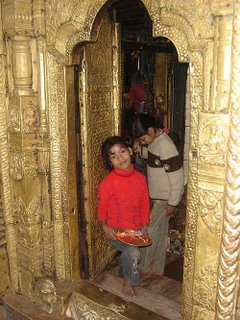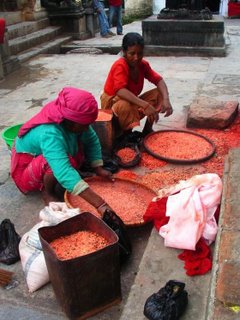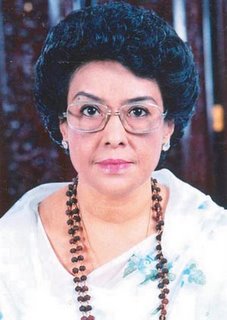Kathmandu, Nepal
There's a strike on today. That means there are no buses, no taxis, and some shops will be closed. My friend Jayanthi
 Lama wants me to come to her grandfather's funeral puja today, but I don't know how I would get there. Her neighborhood, Tinchuli, would take about 1.5 hours to walk too, and I am too sick to walk that far right now.
Lama wants me to come to her grandfather's funeral puja today, but I don't know how I would get there. Her neighborhood, Tinchuli, would take about 1.5 hours to walk too, and I am too sick to walk that far right now. It's my favourite kind of protest - that of students and the general public. Not a pre-planned photo op, and not some special- interest group. (I have now seen enough protests to appreciate their individual nuances.)
"Situation is very bad on the outside today," said my favourite waiter at the hotel, Raj Lama. Raj Lama is seventeen years old and has been working in restaurants full-time since age 15, to help support his mother and siblings back in rural Kavre district. "No taxis, no buses. One American man was here and had to go to airport, he paid 1700NRs (nearly $30) for a cycle rickshaw!" A cycle rickshaw to the airport? that's quite a haul, but "ke garne" (what to do)?
(A taxi ride from Thamel to the airport is never more than 150NRs or about $2.50).
"Ke Garne?" ("what to do?") is the quintessential Nepali expression. People here have been helpless in the face of unchanging reality for so long, but somehow they never give up. They find a way around and through things. I'll never forget seeing tiny Nepali porters (about 5 foot 5) carrying full-sized modern refrigerators on their bent backs, or a full-sized sofa strapped to the top of a rural bus. (how did they even get a sofa up there? was it like building the pyramids, moving giant blocks on rolling logs?)
Even though I haven't left my room because I have a horrible cold and fever, and have been coughing up thick yellow goo for 2 days, I could tell there was a strike. First, it seemed awfully quiet for 10am. Usually by now, there are plenty of taxis honking and motorcycles beeping. Suddenly I heard a tremendous rattling cacophony. It sounded like 2 dozen metal shop gates being pulled closed at once, which is exactly what it was. Almost in unison, the shop keepers (who sit on their front steps waiting for business) jumped up and the corrugated metal gates came cascading down, with the keepers themselves safely behind on the shop side.
At the same time, I heard a chorus of throaty chanting coming down the street, and marching rhythms. About 100 young men, some wearing red kerchiefs but most in the usual t-shirts and jeans, were trooping - loosely, like they hadn't quite decided whether to just jog, or march in semi-formation - down the narrow street, chanting "Loktantra Zindabad, Zindabad" (Long live the rule of the people) . One guy in front carried a satiny red flag aloft, leading the way. A few amazed, dazed white tourists stepped aside (as much as you can since the streets are so narrow); some took photos.
The shopkeepers "down shutters" in case the protest turns violent. Whenever protests turn violent, shops that remain open are targeted (since, if you are sy
 mpathetic to their cause and standing with your fellow Nepalis, you are also meant to be out protesting...not running business as usual). Taxi and bus drivers are supposed to be joining the ranks; those that might disagree don't dare run for fear of reprisal from the strikers and protestors.
mpathetic to their cause and standing with your fellow Nepalis, you are also meant to be out protesting...not running business as usual). Taxi and bus drivers are supposed to be joining the ranks; those that might disagree don't dare run for fear of reprisal from the strikers and protestors.I flashed back to Friday's newspaper headlines. "Petrol price hike." The commerce minister announced on Friday that all petroleum product prices were going up - petrol (gas), diesel, and kerosene. This affects not only buses and taxis, but private vehicles (motorcycles, scooters and the private cars of the middle class) and more immediately for the poor - cooking. The rural poor use wood fires, but the urban poor use kerosene stoves (which only light about 1/3 of the time. You spend more time trying to light the stove than you do cooking on it). Those with a bit more means these days use butane gas that comes heavy, red metal cylinders. These prices are going up 100NRs per cylinder. That's a lot when you only make a couple 100 Nepali rupees a day.
Here is the lead from the Himalayan Times story, plus link:
Price hike fuels national furore
August 19: Protest demonstrations were staged nationwide today against the hike in the prices of petroloeum products. Kathmandu Valley remained tense throughout the day after the students and general public began protesting. Protestors demanded immediate withdrawal of the government's decision besides the reginsation of Ministor for Indisutry, Commerce & Supplies....They vandalized government and private vehicles at Teku, Balaju, Maitidevi, Chabahil and New Baneshwor. A few protestors were injured in police action at Teku....
"On the occasion of her 79th Auspicious Birthday"
 It's also the Queen Mother's Birthday. Queen Ratna, wife of late King Mahendra, somehow managed to escape the massacre instigated by her own grandson and lives on as Dowager Queen or Queen Mother. It's the custom here for the newspapers to print a front-page photo of any royal family member on their birthday, and wish them a "long, happy and prosperous life."
It's also the Queen Mother's Birthday. Queen Ratna, wife of late King Mahendra, somehow managed to escape the massacre instigated by her own grandson and lives on as Dowager Queen or Queen Mother. It's the custom here for the newspapers to print a front-page photo of any royal family member on their birthday, and wish them a "long, happy and prosperous life."It was also"the occasion of" my own mother's 76th birthday a few days ago. Maybe I should continue this Nepali custom on my own website. My own mother is still the Queen Mother in my life. (sorry Mom, I don't have a scanned photo of you....)














No comments:
Post a Comment